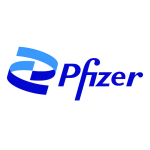Welcome to our dedicated page for Pfizer news (Ticker: PFE), a resource for investors and traders seeking the latest updates and insights on Pfizer stock.
Pfizer Inc. (PFE) is a global biopharmaceutical leader driving innovations in vaccine development and therapeutic treatments. This news hub provides investors and industry professionals with timely updates on corporate developments, regulatory milestones, and market strategies.
Access official press releases, earnings reports, and analysis of Pfizer's clinical trial progress. Our curated collection covers FDA approvals, partnership announcements, and research breakthroughs across oncology, immunology, and infectious disease portfolios.
Key updates include quarterly financial results, manufacturing expansions, and strategic collaborations shaping the pharmaceutical landscape. Bookmark this page for reliable insights into one of healthcare's most influential companies, with content organized for efficient navigation across devices.
ViiV Healthcare, majority owned by GSK with Pfizer (NYSE:PFE) as shareholder, reported significant findings for their HIV treatments. The phase IIIb VOLITION study showed that 89% of treatment-naïve HIV patients chose to switch to long-acting injectable Vocabria + Rekambys after achieving viral suppression with daily Dovato.
Multiple real-world studies demonstrated strong effectiveness: The BEYOND study showed 97% maintained virologic suppression at Month 24, the CARLOS study reported 77.5% virologic suppression with 94.2% on-time injections, and COMBINE-2 revealed 99% virologic suppression across seven European countries.
Implementation studies for Apretude (CAB LA for PrEP) showed 95% satisfaction among participants who switched from oral PrEP, with high acceptability ratings of 4.6/5 at Month 12.
ViiV Healthcare, majority owned by GSK with Pfizer (NYSE:PFE) and Shionogi as shareholders, has expanded its voluntary licensing agreement with the Medicines Patent Pool (MPP) for cabotegravir to include HIV treatment patents.
The expanded agreement allows generic manufacturers to develop and supply long-acting injectable cabotegravir (CAB LA) for HIV treatment in 133 countries, including least-developed, low-income, lower middle-income, and Sub-Saharan African nations. This builds upon their existing agreement for HIV prevention (PrEP).
Three generic manufacturers - Aurobindo, Cipla, and Viatris - will be able to produce generic versions of CAB LA for HIV treatment, following WHO's updated guidance recommending long-acting injectable cabotegravir + rilpivirine as a treatment option.
Pfizer (NYSE:PFE) and Astellas announced positive overall survival (OS) results from their Phase 3 EMBARK study of XTANDI® (enzalutamide) in combination with leuprolide for non-metastatic hormone-sensitive prostate cancer (nmHSPC).
The study demonstrated that XTANDI plus leuprolide achieved statistically significant and clinically meaningful improvement in overall survival compared to placebo plus leuprolide. While XTANDI monotherapy showed a favorable trend, it didn't reach statistical significance. The safety profile remained consistent with previous findings.
XTANDI is currently approved in over 80 countries and has treated more than 1.5 million men with advanced prostate cancer since 2012. The drug is notably the first androgen receptor inhibitor-based regimen to show survival benefits across multiple prostate cancer types.
ViiV Healthcare, majority owned by GSK with Pfizer (NYSE:PFE) and Shionogi as shareholders, presented new data at IAS 2025 demonstrating the effectiveness of its long-acting HIV treatments. The presentations focus on Vocabria + Rekambys (cabotegravir + rilpivirine LA) for HIV treatment and Apretude (cabotegravir long-acting) for HIV prevention.
Key highlights include the phase IIIb VOLITION study results, examining patient preferences for switching to long-acting injectables after achieving viral suppression with Dovato. Additional real-world effectiveness data from multiple studies (COMBINE-2, CARLOS, and BEYOND) demonstrate positive outcomes in various populations. Implementation studies PILLAR and EBONI show promising results for CAB LA in specific demographic groups.
The conference presentations also include new data from the Positive Perspectives wave three study, highlighting the impact of shared decision-making on treatment outcomes and patient satisfaction.
Pfizer (NYSE:PFE) announced positive topline results from the Phase 3 BASIS study of HYMPAVZI™ (marstacimab) for hemophilia A or B patients with inhibitors. The study demonstrated 93% reduction in annualized bleeding rate (ABR 1.39 vs 19.78; p < 0.0001) compared to on-demand treatment.
The trial involved 48 patients over a 12-month period, showing superiority across all bleeding-related secondary endpoints. HYMPAVZI offers a once-weekly subcutaneous injection with minimal preparation, targeting the Kunitz 2 domain of TFPI. The treatment was generally well-tolerated with no deaths or thromboembolic events reported.
This development is significant as approximately 20% of hemophilia A and 3% of hemophilia B patients develop inhibitors that render traditional factor replacement therapies ineffective.
Pfizer (NYSE:PFE) has announced its third-quarter 2025 dividend of $0.43 per share, maintaining its consistent dividend payment history. The dividend will be paid on September 2, 2025, to shareholders of record as of July 25, 2025. This marks Pfizer's 347th consecutive quarterly dividend, demonstrating the company's long-standing commitment to returning value to shareholders.
Pfizer (NYSE: PFE) has announced a conference call with investment analysts scheduled for August 5, 2025, at 10:00 a.m. EDT. The call will discuss the company's Second Quarter 2025 Performance Report, which will be released that morning.
Investors and the public can access the webcast through www.pfizer.com/investors. Participants can also join via phone using the following numbers: 800-456-4352 (US/Canada) or 785-424-1086 (International) with passcode "49385". The webcast replay and transcript will be available on Pfizer's website within 24 hours after the call and will remain accessible for at least 90 days.


